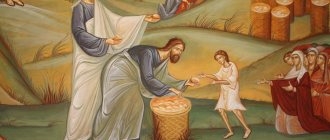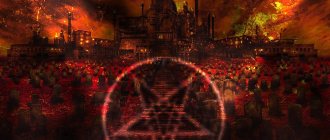THOMAS
Knowing all this in advance, was it not cruelty on His part to create this world?
Reader question:
I believe in God, but I cannot accept the Christian axiom that God is Love. After all, if God is omniscient, then, when deciding to create the world, He initially foresaw how much grief and suffering awaited humanity in its history, how much blood and tears would be shed. But, most importantly, He foresaw that millions of people would not be saved, would destroy their souls, and upon death would go into eternal torment. Knowing all this in advance, was it not cruelty on His part to create this world? And, in particular, how can an all-good God give life to a person whose future spiritual death He knows in advance? Please answer, this is very important to me.
Best regards, Yakov
Alexander Tkachenko answers:
The history of humanity is the history of human suffering. We try not to think about it, but if we try to look at any era in the life of any people, the picture that emerges is simply depressing. Endless wars, oppression of the weak, violence, triumphant injustice, cruel crimes and no less cruel punishments for them, sophisticated executions, torture... Everywhere and always, practically the same thing - blood, tears, suffering. And in those short intervals when people did not kill or torture each other, floods, fires, earthquakes fell upon them, they were tormented by diseases and pestilences; droughts and locusts destroyed the harvest in their fields, dooming people to hunger and poverty. And if we assume that God created this crazy world and this unfortunate man, the question inevitably arises: what moral qualities should such a deity have? The conclusions suggest themselves: either this deity is incredibly cruel and merciless, or he is deeply indifferent to everything that happens in the world he created.
This is exactly how the pagan world saw its gods. And it doesn’t matter what culture or historical period we are talking about. The attitude of the pagan gods towards people has always and everywhere been thought of as quite definite: either merciless justice, from which no one born can escape, or indifference on the verge of insanity.
And the Phoenician Baal, into whose red-hot statue dozens of newborn babies were thrown every day; and the Greek celestials, frolicking on Olympus, each in their own way; and the Hindu Brahman, who created the world and happily fell asleep, leaving it unattended - all of them were quite consistent with the sad picture of the world over which such gods stand. True, this correspondence hardly made the person feel any better. But here, at least, everything was clear: the world is cruel because the god who rules it is cruel.
And suddenly this strange Christianity appears, which proclaims that God is not indifferent to the fate of people. Moreover: Christians claim that God loves us, God is Love, and it is love, and not justice, that is the measure of God’s attitude towards humanity. The statement is completely unprecedented and fundamentally contrary to the life experience of any person. No, of course, the thought of God’s love for people in itself is very beautiful and comforting. But no matter how much you say “halva,” it won’t make your mouth any sweeter. Let's assume that God really exists - love. And immediately, instead of a hopeless, but completely clear and logical pagan picture of the world, we get obvious nonsense. How did God-Love allow this whole nightmare of human history, with its wars, violence, rivers of shed blood? Where did He look when the people He loved were suffering and tormented so cruelly? And most importantly: why did a loving God create man, knowing what sad fate awaited him?
These questions are quite relevant today, since, unfortunately, pain and grief in the world have hardly diminished since the times of the Gospel. But in order to answer them, it is necessary to first understand: what exactly is suffering, and will humanity become happier if it loses the ability to experience it?
Geiger counter
Probably every housewife is familiar with the smell of gas from an accidentally flooded kitchen stove. It smells so unpleasant that even the most ignorant person in safety matters understands that the room urgently needs to be ventilated. But not everyone knows that natural gas itself has no odor. And that stench that we feel from time to time in our kitchen is the result of the creative efforts of chemists who developed a substance with a vile odor - an odorant. It is added to the network gas just so that anyone can immediately detect a leak by smell. The odorant smells bad, but without it, the odorless gas could cause a lot of trouble. In the same way, it would be wrong to consider suffering as evil.
It is only a reaction of our nature to evil, a kind of danger signal shouting: “Man, be careful! You find yourself in the sphere of the destructive process, beware! And it doesn’t really matter what exactly we suffer from: we can step on a nail, suffer from remorse, suffer from a hangover... The external causes of suffering can be very different, but their essence is always the same - a person has been touched by evil, which seeks to destroy him . This evil is invisible, it acts on the sly. And, if suffering had not warned us of its approach, we would have long ago died from blood poisoning, alcohol poisoning, or from the consequences of those sinful acts to which our conscience would no longer react with mental pain. To better understand the relationship between evil and suffering, we can recall the accident at the Chernobyl nuclear power plant. In eliminating its consequences, people are faced with a mortal danger that human nature cannot recognize, because penetrating radiation kills without pain. We simply do not have organs or receptors in our bodies that would respond to increased background radiation.
Now imagine: a piece of city sidewalk in front of a multi-story building. On the asphalt there is a cheerful face drawn with chalk, a cigarette butt, a manhole cover... In general, nothing special. But death lurks here. On this section of the sidewalk there is a “dirty” spot with a radioactive background - 1800 microroentgens per hour. With a permissible level of 18 and a lethal level of 180. A person who rushes onto this sidewalk from the twelfth floor has a better chance of surviving than someone who simply stands on it for a few minutes. And this danger could only be seen with the help of special devices - Geiger counters, which recorded the level of radiation, and if the permissible norm was exceeded, warned people about invisible death hiding somewhere nearby.
Like a Geiger counter, our capacity for suffering helps us sense the approach of evil that cannot otherwise be detected. Suffering is not evil, it is a protest against evil, it is a flash of pain at the point where evil touches good.
But how much evil is there in the world if it is literally filled with suffering! What is this very evil that makes people suffer, where did it come from, and why doesn’t God destroy it immediately and forever if He is good and omnipotent?
A REAL TREASURE!
I've worked with a lot of people over the years, and I know that people you can completely rely on are rare. Most are distracted from completing the task assigned to them by something else. At first they try to be faithful, but then they get distracted by other different things. Almost all pastors can confirm that more often than not, people who start something do not finish it. But when you manage to find a person who is faithful, trustworthy, reliable and unshakable, you can consider this a rare find, a real treasure.
Freedom for Pinocchio!
“If God is omnipotent, can He create such a heavy stone that He himself cannot lift it?” - before the revolution, mischievous seminarians baffled uncouth beginners with this tricky riddle. If he cannot create, then he is not omnipotent; if he creates, but does not raise, he is still not omnipotent. For all its apparent frivolity, this puzzle contains a very serious philosophical problem: can a creation, in principle, be beyond the control of the Creator? Is it possible for an omnipotent God to create something over which he does not have absolute power? Is He capable of limiting His own omnipotence?
The questions are very serious, but in the Orthodox faith there is a completely clear answer to them. Saint Philaret of Moscow said about the riddle about the stone: “God not only can create such a stone, but has already created it. This stone is a man.” The Church teaches that God created man for his participation in the bliss of existence. The whole world was arranged in such a way that the existence of people in this world filled their lives with joy and fun, and the main joy of existence for a person was God’s love for him. But only those who are free in their choice can respond to love.
And God gave man this amazing opportunity - to love or not to love his Creator. So, in the huge world He created, which was completely subordinate to its Creator, a territory suddenly appeared over which He had no power. This was the heart of a person, which only he himself could fill with love for God. But he could just as freely refuse this love.
It is on this territory, beyond the control of God, that evil is born as a result of freedom misused by man. Evil has no essence because it was not created by God. Darkness is just the absence of light, and cold is the absence of heat. Likewise, evil is not a separate category of being opposed to good, but simply the absence of good where man did not allow God to enter. Therefore, it is impossible to destroy evil by force, just as it is impossible to erase a shadow from the earth. Evil is the darkness that lives in the hearts of people who do not want to let the light of God's love into themselves. But if God forcibly expelled this darkness from the human soul, then people would cease to be people and would turn into zombies, into automata, rigidly programmed to be good and obedient to God. And then there could be no talk of any love, because robots cannot love. Saint Gregory the Theologian says: “Salvation is for those who wish, and not for those who are raped.” And here are the words of Simeon the New Theologian on the same occasion: “No one has ever become good under duress.”
In this sense, the problem of human freedom is very well illuminated by the well-known fairy tale about the wooden man Pinocchio. He did not listen to Papa Carlo, ignored the instructions of the wise cricket, squandered the jacket and alphabet in the theater that his father bought for him with his last money, and got involved with petty criminals. As a result, he got into a lot of trouble, suffered a lot, and did not die in the swamp only because he was absolutely made of wood. Why did Pinocchio suffer? Because he “went into the shadows”, disdainfully rejecting the love of everyone to whom he was dear. But was Papa Carlo to blame for his suffering? Let's figure it out.
Suppose that Papa Carlo, having whittled Pinocchio out of a log, decided to deprive his favorite of the very opportunity to have fun in a reprehensible way. And he nailed Pinocchio to the floor. He loved him very much, bought him the best alphabet book and the most beautiful paper jacket, fed him the most delicious onions and... No, perhaps that’s enough. It turns out to be a very dark fairy tale. Such well-being is worse than any Karabas-Barabas. And Papa Carlo looks a bit dubious here.
It would be better to leave the traditional version of the tale, which clearly resembles the Gospel parable of the Prodigal Son. Both of these stories help to understand the most important meaning of the suffering of a person who has come into contact with evil: by suffering, people come to their senses.
“When he came to himself, he said, “How many of my father’s hired servants have bread to spare, but I am dying of hunger; I will get up and go to my father and say to him: Father! I have sinned against heaven and before you...” (Luke 15:17-18).
DO YOU HAVE A TASK RIGHT NOW?
Today I want to ask you:
What assignment has God given you? Perhaps this assignment is related to work or relationships, an assignment to solve some personal problems? Can you name now the most important assignment God has given you—the one that He is watching most closely? If you don't know what God wants you to do now, ask Him to help you understand what your task is and do it to the best of your ability so that He can entrust you with something more significant. Determine and even commit yourself to do everything in your power so that God will find you faithful in doing His will - in carrying out the simple task He has given you - so that He can then entrust you with a more important task.
Smoke of great dislike
Andrei Makarevich in one of his songs found a very accurate definition of human history from an Orthodox point of view - “The Age of Great Dislike.” People who did not have love in their hearts for their Creator were unable to love each other. Moreover, they could not treat with love the beautiful world that God gave them as their inheritance. All the evil in the world, all the suffering of humanity throughout its history is just a reflection of our dislike for God, for each other, and for the world around us.
You can offend, rob, torture and kill only those you don’t love. This is the root of all human suffering and troubles. Even natural disasters are often a consequence of human moral degradation. We cannot accurately trace this dependence in all cases, but sometimes it is quite obvious.
When in the summer all of Moscow is filled with acrid smoke from burning peat bogs, you need to know that this natural disaster has specific authors. During the first five-year plans of Soviet power, the government decided to drain the Kashira peat bogs in order to create a huge fuel resource for the Kashira power plant, which then operated on peat. This was done under the motto: “We should not wait for favors from nature, to take them from her - that is our task!” The swamps have been drained, and the power plant has long been running on coal and fuel oil. But the peat of the drained swamps burns every year due to the negligence of tourists and local residents, who were placed on this powder keg by fighters against nature who did not want to expect mercy from it. As a result, all Muscovites suffer. But it is not God who is to blame for this, but human dislike for God and His creation.
VALUABLE FIND
This means that people who have the qualities that God wants to see in them in order to use them in the implementation of His plans are not found at every turn. Faithful, reliable, trustworthy, steadfast people are so rare that God has to make a careful, thorough search to find them. And when, as a result of observing a believer, God comes to the conclusion that he really strives to do His will, and in the best possible way, He understands that he has made a valuable discovery. He has found a faithful person whom he can rely on and entrust him with an important task.
Two ways
But maybe the Lord has given man too much freedom? Maybe some “Pinocchio”, such as Hitler or Chikatilo, should still be nailed to the floor and deprived of the opportunity to realize their freedom in the ways they love? Alas, then each of us would have to be handcuffed at an early age. Because there is not and has not been a person on earth who would not at least once cause pain to other people. But who, besides God, can determine the measure of evil, let’s say, “acceptable” for this or that person? We are outraged by the cruelty of the villains brought to justice. And how many villains have not yet been caught, how many people are around us, seemingly quite normal, but in whose souls the darkness of evil plans smolders... Finally, how much all sorts of abomination is in us ourselves, how many small or large nasty things we have committed, or, what is much worse, we can to commit because we do not love God and our neighbor...
But the Lord is in no hurry to stop a person on his confused everyday roads. He is waiting for our repentance, waiting for each of us to simply be unable to look at the traces of evil in our souls without disgust. In Shakespeare, Hamlet “...turned his eyes with his pupils into his soul, and there, everywhere, there were spots of blackness.” Having seen this sinful blackness in his heart, a person, again, is free to choose his attitude towards what he saw. He may be horrified and say: “Lord, is it really me? What a nightmare! But I don't want to be like that, I want to change. God, come and help me!
God is patiently waiting for this invitation from each of us. An amazing thing: Almighty God humbly asks permission to enter our heart, stained with dirt, so as not to violate our freedom: “Behold, I stand at the door and knock; If anyone hears My voice and opens the door, I will come in to him and dine with him, and he with Me” (Rev. 3:20). And if this meeting of a person with God has taken place, their joint work begins to restore all the destruction that evil has caused in human nature. This is the path of repentance.
However, freedom of choice also implies another path. Black spots are visible only on a light background, but if the whole soul becomes black, the spots will no longer be noticeable. Therefore, having seen evil in himself, a person can completely submit to it, consoling himself with the thought that it is not evil at all. And then it will turn out that the offended were themselves to blame, the victims deserved their suffering, and entire nations will be recorded as “subhumans”, with whom you can do whatever comes to your mind. You can no longer reach such a blackened heart... But what happens after death to a soul that has been disfigured by evil to such an extent?
FAITHFUL, RELIABLE, TRUSTWORTHY
One of the answers to this question is given to us by the Apostle Paul in 1 Corinthians 4:2.
He states this here so emphatically that one gets the impression that this quality is high on God's list of requirements for those chosen to do His work. Here's what he wrote:
“It is required of stewards that everyone should be faithful.”
I would like to draw your attention to the word “faithful”.
The Greek word pistos
, “faithful,” is derived from the Greek
pistis
, “faith.”
However, in 1 Corinthians 4:2
the word
pistos
does not mean “faith,” but “fidelity.” It characterizes a person whom God has considered faithful, reliable, trustworthy, and unshakable.
Fatal Changeling
The Church says that an unrepentant sinner does not inherit salvation and goes into eternal torment. It is very important to understand here that salvation is not a gift from Santa Claus, not a ticket to a privileged holiday home, or winning the lottery. This is the unity of the human spirit with the Spirit of God, the interpenetration of the Creator and the man he created, the indwelling of God in our hearts as a consequence of mutual love.
But can someone who has hated Him all their life love God after death?
Suffering is the result of the contact of evil with good. But if the soul itself has become evil, any touch of goodness will be painful for it. This monstrous upheaval of the sinner’s nature is the cause of his suffering. After his death, God, of course, does not deprive him of His love. But the whole trouble is that the blackened soul, saturated with evil, perceives the love of God as torment. The Monk Isaac the Syrian speaks about it this way: “I say that those tormented in Gehenna are struck by the scourge of love! And how bitter and cruel is this torment of love! For those who feel that they have sinned against love endure torment greater than any torment that leads to fear; The sadness that strikes the heart for sin against love is more terrible than any possible punishment.”
How can you help someone for whom the source of suffering is the love of God? This is truly an unsolvable mystery. But to contrast the love of God and the eternal torment of sinners is, to say the least, incorrect. A sinner can suffer forever because God will love him forever. And there is no contradiction here. There is another question, more interesting and important. The Church teaches that God allows each person in his life exactly as much suffering as he is able to endure. In other words, suffering is used by God as a bitter, but necessary and strictly dosed medicine. But what happens to those suffering from God’s love after death? St. Isaac the Syrian says: “God is not the avenger of evil, but the corrector of evil. The first is characteristic of evil people, the second is characteristic of the father.”
GOD CALLS US TO RAISE HIGHER
Do you think God finds you faithful in doing His will, from the simple tasks assigned to you to such an important matter as fulfilling your calling? I hope this letter was interesting and useful for you. This letter motivated me to be even more obedient to God and serve Him even better. It became a test for myself, because I always try to do everything that the Lord tells me. Right now He is calling me to rise higher. I know it. What is God calling you to? I am confident that you will be faithful and take on your God-given assignments with renewed vigor and complete them to the best of your ability.
Hope and freedom
Christ says about unrepentant sinners: “And these will go away into eternal torment, but the righteous into eternal life” (Matthew 25:46). It is very important to understand here that eternity is not a synonym for infinity. There is a fundamental difference between these two concepts. The infinity of torment implies a process unlimited in time. Eternity is the absence of time itself at all. Eternal torment is torment that occurs in eternity, and not in time, but this does not at all mean that it cannot end. The categories “past-present-future” or “beginning-ending” cannot be applied to eternity at all, since all of these are characteristics of temporary processes. Gregory the Theologian spoke about it this way: “Eternity is an extension that continually flows not in time. And time is a measure of solar movement." It is difficult for us, living in time, to imagine what it is, we have no experience of such timeless existence, we do not even have concepts and words to describe eternity. But we have a formidable warning from Christ that in eternity the love of God will turn out to be torment for those who consciously rejected this love in their temporary life.
God eternally loves man, and man is free to eternally reject this love, to perceive it as torment, for which only he himself will be to blame. Logically everything fits here. But God is Love. And love is above logic. And this is not an axiom, but the result of personal experience of living communication with God of many, many generations of Christians. Some of them, like Rev. Isaac the Syrian, were filled with this love of God so much that they believed that such love would overcome all obstacles, because nothing is impossible for God, and He is able to save, in the end, everyone.
This is not the dogmatic teaching of the Church, but it is an expression of the hope of Christians that, contrary to all justice, logic and laws of nature, every person, no matter how lost, will receive the opportunity of salvation by the grace of the All-Good God. However, every person is free to reject this salvation. And the torments of hell, even if they (as Isaac the Syrian and St. Gregory of Nyssa believed) have an end, will not cease to be torments. When teeth hurt, a person loses the sense of time; it seems to him that this pain has been with him forever and will never end. What can we say then about Gehenna, about which the Monk Isaac the Syrian said: “Let us beware in our souls and understand that although Gehenna is subject to limitation, the taste of being in it is very terrible, and beyond the limits of our knowledge is the degree of suffering in it.”
God has prepared for us eternal joy, not eternal torment. But the great gift of freedom requires a person to handle it extremely responsibly. Because only the almighty God has no power over our heart. And if we do not fill it with love for God, evil will certainly appear there, giving rise to suffering.
BEFORE YOU TRUST MORE...
If you were an employer, before you promoted a person and gave him greater responsibility, wouldn't you observe him to see if he would be faithful? If people do this when they are looking for a person who can be entrusted with fulfilling even important, but still temporary, from the point of view of eternal life, responsibilities, all the more will God do this when choosing people to whom He can entrust a mission, the fulfillment of which will affect that where people will spend eternity. There is nothing more serious than eternal destiny, which is why God, before entrusting someone with important spiritual matters, will observe him to see if this person will be faithful.










